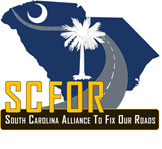South Carolina’s transportation infrastructure is funded with federal dollars and state revenues generated from motor fuel user fees and vehicle-related fees. Federal funds account for nearly 50% of transportation spending in South Carolina, while state revenues make up the other half.
In South Carolina, the state motor fuel user fee (aka the “gas tax”) is the primary source of state revenue for roads and bridges.
Beginning July 1, when drivers fill up with gasoline or diesel, they will pay two cents more per gallon. This increase will bring the total state taxes/fees on fuel to 24.75 cents per gallon.
The new revenues are part of the plan passed in 2017 to increase the fuel tax by 12 cents over a period of six years, to help generate desperately needed revenues so the state could begin tackling long-overdue repairs to our roads and bridges.
As South Carolina works to address this monumental task, these revenues serve as the foundation for getting that work done. Learn more about how the new revenues are being spent here.
Using the interactive maps below, take a look at how South Carolina compares to other states. You will see that despite our increase, we remain significantly lower than our sister states and much lower than the national average.
Unfortunately, South Carolina is having to playing catch-up, and it’s going to take time to address the amount of work that needs to be done. The good news is, progress is being made and the new revenues are being invested to address repairs in every county in South Carolina.

South Carolina is not alone when it comes to investing in road and bridge repairs. Since 2013, 31 states have increased their fuel taxes to address infrastructure needs.

